Gaura Purnima
- Event:
- Gaura Purnima
- Date:
- March 27, 2013 (Mayapur)
- Category: Major festivals
"This account originally appeared in a short work by Srila
Bhaktivinoda Thakura entitled, 'Sri Caitanya Mahaprabhu: His Life and
Precepts.' (dated 20th August 1896.)" This was taken from "Prologue" to
"Teachings of Lord Caitanya" (A.C.Bhaktivedanta Swami Prabhupada. 1974.
pages xiii-xxii.)
"Caitanya Mahaprabhu was born in Mayapur in the town of Nadia just
after sunset on the evening of the 23rd Phalguna (1407 Sakadba),
answering to the 18th of February 1486 of the Christian Era. The moon
was eclipsed at the time of His birth, and the people of Nadia were then
engaged, as was usual on such occasions, in bathing in the Bhagirathi
with loud cheers of Haribol. His father, Jagannatha Misra, a poor
'brahmana' of the Vedic order, and His mother, Saci-devi, a model good
woman, both descended from 'brahmana' stock originally residing in
Sylhet. Mahaprabhu was a beautiful child, and the ladies of the town
came to see Him with presents. His mother's father, Pandita Nilambara
Cakravarti, a renowned astrologer, foretold that the child would be a
great personage in time; and he, therefore, gave him the name
Visvambhara. The ladies of the neighbourhood styled him Gaurahari on
account of His golden complexion, and His mother called Him Nimai on
account of the 'nimba' tree near which He was born. Beautiful as the lad
was, everyone heartily loved to see Him every day. As He grew up He
became a whimsical and frolicsome lad. After His fifth year, He was
admitted into a pathasala where He picked up Bengali in a very short
time.
"Most of His contemporary biographers have mentioned certain anecdotes regarding Caitanya which are simple records of His early miracles. It is said that when He was an infant in His mother's arms He wept continually, and when the neighbouring ladies cried 'Haribol' He used to stop. Thus there was a continuation of utterance of 'Haribol' in the house, foreshewing the future mission of the hero. It has also been stated that when His mother gave Him sweetmeats to eat, He ate clay instead of the food. His mother, asking for the reason, He stated that as every sweetmeat was nothing but clay transformed, He could eat clay as well. His mother, who was also the consort of a 'pandita', explained that every article in a special state was adapted to a special use. Earth, while in the state of a jug, could be used as a water pot, but in the state of a brick such a use was not possible. Clay, therefore in the form of sweetmeats was usable as food, but clay in its other states was not. The lad was convinced and admitted His stupidity in eating clay and agreed to avoid the mistake in the future. Another miraculous act has been related.
It is said that a brahmana on pilgrimage became a guest in His house, cooked food and read grace with meditation upon Krsna. In the meantime the lad came and ate up the cooked rice. The 'brahmana', astonished at the lad's act, cooked again at the request of Jagannatha Misra. The lad again ate up the cooked rice while the 'brahmana' was offering the rice to Krsna with meditation. The 'brahmana' was persuaded to cook for the third time. This time all the inmates of the house had fallen asleep, and so the lad showed Himself as Krsna to the traveller and blessed him. The 'brahmana' was then lost in ecstasy at the appearance of the object of his worship.
It has also been stated that two thieves stole away the lad from His father's door with a view to purloin His jewels and gave Him sweetmeats on the way. The lad exercised His illusory energy and deceived the thieves back towards His own house. The thieves, for fear of detection, left the boy there and fled. Another miraculous act that has been described is the lad's demanding and getting from Hiranya and Jagadisa all the offerings they had collected for worshiping Krsna on the day of Ekadasi. When only four years of age He sat on rejected cooking pots which were considered unholy by His mother. He explained to His mother that there was no question of holiness and unholiness as regards to earthen pots thrown away after the cooking was over. These anecdotes relate to His tender age up to the fifth year.
"In His eighth year, He was admitted into the tola of Gangadasa Pandita in Ganganagara close by the village of Mayapur. In two years He became well read in Sanskrit grammar and rhetoric. His readings after that were of the nature of self-study in His own house, where He had found all-important books belonging to His father, who was a 'pandita' himself. It appears that He read the 'smrti' in His own study, and the 'nyaya' also, in competition with His friends, who were then studying under the celebrated 'pandita' Raghunatha Siromani.
"Now, after the tenth year of His age, Caitanya became a passable scholar in grammar, rhetoric, the 'smrti' and the 'nyaya'. It was after this that his elder brother Visvarupa left his house and accepted the 'ashrama' (status) of a 'sannyasi' (ascetic). Caitanya, though a very young boy, consoled His parents, saying that He would serve them with a view to please God. Just after that, His father left this world. His mother was exceedingly sorry, and Mahaprabhu, with His usual contented appearance, consoled His widowed mother.
It was at the age of 14 or 15 that Mahaprabhu was married to Laksmidevi, the daughter of Vallabhacarya, also of Nadia. He was at this age considered one of the best scholars of Nadia, then renowned seat of 'nyaya' philosophy and Sanskrit learning. Not to speak of the 'smarta panditas', the 'Naiyayikas' were all afraid of confronting Him in literary discussions. Being a married man, He went to Eastern Bengal on the banks of the Padma for acquirement of wealth. There He displayed His learning and obtained a good sum of money. It was at this time that He preached Vaisnavism at intervals. After teaching him the principles of Vaisnavism, He ordered Tapanamisra to go to and live in Benares. During His residence in East Bengal, His wife Laksmidevi left this world from the effects of snake bite. On returning home, He found His mother in a mourning state.
He consoled her with a lecture on the uncertainty of human affairs. It was at His mother's request that He married Visnupriya, the daughter of Raja Pandita Sanatana Misra. His comrades joined Him on His return from pravasa or sojourn. He was now so renowned that He was considered to be the best pandita in Nadia. Kesava Misra of Kashmir, who had called himself the Great Digvijayi, came to Nadia with a view to discuss with the 'pandita' of that place. Afraid of the so-called conquering pandita, the tola professors of Nadia left their town on pretence of invitation. Kesava met Mahaprabhu at the Barokona-ghata in Mayapur, and after a very short discussion with Him he was defeated by the boy, and mortification obliged him to decamp. Nimai Pandita was now the most important 'pandita' of His times.
"It was at the age of 16 or 17 that He travelled to Gaya with a host of His students and there took His spiritual initiation from Isvara Puri, a Vaisnava 'sannyasi' and a disciple of the renowned Madhavendra Puri. Upon His return to Nadia, Nimai Pandita turned religious preacher, and His religious nature became so strongly represented that Advaita Prabhu, Srivasa and others who had before the birth of Caitanya already accepted the Vaisnava faith were astonished at the change of the young man. He was then no more a contending 'naiyayika', a wrangling 'smarta' and a criticizing rhetorician.
He swooned at the name of Krsna and behaved as an inspired man under the influence of His religious sentiment. It has been described by Murari Gupta, an eye-witness, that He showed His heavenly powers in the house of Srivasa Pandita in the presence of hundreds of His followers, who were mostly well-read scholars. It was at this time that He opened a nocturnal school of 'kirtana' in the compound of Srivasa Pandita with His sincere followers. There He preached, there He sang, there He danced, and there He expressed all sorts of religious feelings. Nityananda Prabhu, who was then a preacher of Vaisnavism and who had then completed His travels all over India, joined Him at that time. In fact, a host of 'pandita' preachers of Vaisnavism, all sincere at heart, came and joined Him from different parts of Bengal. Nadia now became the regular seat of a host of Vaisnava 'acaryas' whose mission it was to spiritualize mankind with the highest influence of the Vaisnava creed.
"The first mandate that He issued to Prabhu Nityananda and Haridasa was this: 'Go, friends, go through the streets of the town, meet every man at his door and ask him to sing the name of Hari with a holy life, and you then come and report to Me every evening the result of your preaching.' Thus ordered, the two preachers went on and met Jagai and Madhai, two most abominable characters. They insulted the preachers on hearing Mahaprabhu's mandate, but were soon converted by the influence of 'bhakti' (devotion) inculcated by their Lord. The people of Nadia were now surprised. They said, 'Nimai Pandita is not only a gigantic genius, but He is certainly a missionary from God Almighty.' From this time to His twenty-third year, Mahaprabhu preached His principles not only in Nadia but in all important towns and villages around His city. In the houses of
To his followers he showed miracles, taught the esoteric principles of 'bhakti' and sang His 'sankirtan' with other bhaktas. His followers of the town of Nadia commenced to sing the holy name of Hari in the streets and bazaars. This created a sensation and roused different feelings in different quarters. The 'bhaktas' were highly pleased. The 'smarta brahmanas' became jealous of Nimai Pandita's success and complained to Chand Kazi against the character of Caitanya as un-Hindu. The Kazi came to Srivasa Pandita's house and broke a 'mrdanga' ('khola' drum) there and declared that unless Nimai Pandit ceased to make noise about His queer religion he would be obliged to enforce Mohammedanism on Him and His followers. This was brought to Mahaprabhu's notice.
He ordered the townspeople to appear in the evening each with a torch in his hand. This they did, and Nimai marched out with His 'sankirtan' divided in 14 groups, and on His arrival in the Kazi's house, He held a long conversation with the Kazi and in the end communicated into his heart His Vaisnava influence by touching his body. The Kazi then wept and admitted that he had felt a keen spiritual influence which had cleared up his doubts and produced in him a religious sentiment which gave him the highest ecstasy. The Kazi then joined the sankirtan party. The world was astonished at the spiritual power of the Great Lord, and hundreds and hundreds of heretics converted and joined the banner of Visvambhara after this affair.
"It was after this that some of the jealous and low-minded 'brahmanas' of Kulia picked a quarrel with Mahaprabhu and collected a party to oppose Him. Nimai Pandita was naturally a soft-hearted person, though strong in His principles. He declared that party feelings and sectarianism were the two great enemies of progress and that as long as He should continue to be an inhabitant of Nadia belonging to a certain family, His mission would not meet with complete success. He then resolved to be a citizen of the world by cutting His connection with His particular family, caste and creed, and with this resolution He embraced the position of a 'sannyasi' at Katwa, under the guidance of Keshava Bharati of that town, on the 24th year of His age. His mother and wife wept bitterly for His separation, but our hero, though soft in heart, was a strong person in principle. He left His little world in His house for the unlimited spiritual world of Krsna with man in general.
"After His 'sannyasa', He was induced to visit the house of Advaita Prabhu in Santipura. Advaita managed to invite all His friends and admirers from Nadia and brought Sacidevi to see her son. Both pleasure and pain invaded her heart when she saw her son in the attire of a 'sannyasi'. As a 'sannyasi', Krsna Caitanya put on nothing but a 'kaupina' (two pieces of cloth, a loin cloth) and a 'bahirvasa' (outer covering). His head was without hair, and His hands bore a 'danda' (stick) and a 'kamandalu' (hermit's water pot). The Holy Son fell at the feet of His beloved mother and said, "Mother! This body is yours, and I must obey your orders. Permit me to go to Vrndavana for My spiritual attainments."
The mother, in consultation with Advaita and others, asked her son to reside in Puri (the town of Jagannatha) so that she might obtain His information now and then. Mahaprabhu agreed to that proposition and in a few days left Santipura for Orissa.
His biographers have described the journey of Krsna Caitanya (that was the name He got after His 'sannyasa') from Santipura to Puri in great detail. He travelled along the side of the Bhagirathi as far as Chatrabhoga, situated now in Thana Mathurapura, Diamond Harbour, 24 Parganas. There He took a boat and went as far as Prayaga-ghata in the Midnapura District. Thence He walked through Balasore and Cuttack to Puri, seeing the temple of Bhuvanesvara on His way. Upon His arrival at Puri He saw Jagannatha in the temple and resided with Sarvabhauma at the request of the latter.
Sarvabhauma was a gigantic 'pandita' of the day. His readings knew no bounds. He was the best 'naiyayika' of the times and was known as the most erudite scholar in the Vedanta philosophy of the school of Sankaracarya. He was born in Nadia (Vidyanagara) and taught innumerable pupils in the 'nyaya' philosophy in his tola there. He had left for Puri some time before the birth of Nimai Pandita. His brother-in-law Gopinatha Misra introduced our new sannyasi to Sarvabhauma, who was astonished at His personal beauty and feared that it would be difficult for the young man to maintain 'sannyasa-dharma' during the long run of His life. Gopinatha, who had known Mahaprabhu from Nadia, had a great reverence for Him and declared that the 'sannyasi' was not a common human being. On this point Gopinatha and Sarvabhauma had a hot discussion.
Sarvabhauma then requested Mahaprabhu to hear his recitation of the Vedanta-sutras, and the latter tacitly submitted. Caitanya heard with silence what the great Sarvabhauma uttered with gravity for seven days, at the end of which the latter said, 'Krsna-Caitanya! I think You do not understand the Vedanta, for You do not say anything after hearing my recitation and explanations.' The reply of Caitanya was that He understood the sutras very well, but He could not make out what Sankaracarya meant by his commentaries. Astonished as this, Sarvabhauma said, 'How is it that you understand the meanings of the 'sutras' and do not understand the commentaries which explain the 'sutras'? All well! If You understand the 'sutras', please let me have Your interpretations.' Mahaprabhu thereon explained all the 'sutras' in His own way without touching the pantheistic commentary of Sankara. The keen understanding of Sarvabhauma saw the truth, beauty and harmony of arguments in the explanations given by Caitanya and obliged Him to utter that it was the first time that he had found one who could explain the Brahma-sutras in such a simple manner. He admitted also that the commentaries of Sankara never gave such natural explanations of the Vedanta-sutras as he had obtained from Mahaprabhu. He then submitted himself as an advocate and follower. In a few days Sarvabhauma turned out to be one of the best Vaisnavas of the time. When reports of this came out, the whole of Orissa sang the praise of Krsna Caitanya, and hundred and hundreds came to Him and became His followers. In the meantime Mahaprabhu thought of visiting Southern India, and He started with one Krsnadasa Brahmana for the journey.
"His biographers have given us a detail of the journey. He went first to Kurmaksetra, where He performed a miracle by curing a leper named Vasudeva. He met Ramananda Raya, the Governor of Vidyanagara, on the banks of the Godavari and had a philosophical conversation with him on the subject of 'prema-bhakti'. He worked another miracle by touching (making them immediately disappear) the seven 'tala-trees' through which Ramacandra, the son of Dasaratha, had shot His arrow and killed the great Bali Raja. He preached Vaisnavism and 'nama-sankirtana' throughout the journey. At Rangaksetra He stayed for four months in the house of one Venkata Bhatta in order to spend the rainy season. There He converted the whole family of Venkata from Ramanuja Vaisnavism to Krsna-bhakti, along with the son of Venkata, a boy of ten years named Gopala, who afterwards came to Vrndavana and became one of the six Goswamis or prophets serving under their leader Sri Krsna Caitanya. Trained up in Sanskrit by his uncle Prabodhananda Sarasvati, Gopala wrote several books on Vaisnavism.
"Sri Caitanya visited numerous places in Southern India as far as Cape Comorin and returned to Puri in two years by Pandepura on the Bhima. In this latter place He spiritualized one Tukarama, who became from that time a religious preacher himself. This fact has been admitted in his 'adhangas', which have been collected in a volume by Mr. Satyendra Nath Tagore of the Bombay Civil Service. During His journey He had several discussions with the Buddhists, the Jains and the 'mayavadis' in several places and converted His opponents to Vaisnavism.
"Upon His return to Puri, Raja Prataparudra-deva and several 'pandita brahmanas' joined the banner of Caitanya Mahaprabhu. He was now twenty-seven years of age. In His twenty-eighth year He went to Bengal as far as Gauda in Mald. There He picked up two great personages named Rupa and Sanatana. Though descended from the lines of Karnatic brahmanas, these two brothers turned demi-Moslems by their continual contact with Hussain Shah, the then Emperor of Gauda. Their names had been changed by the Emperor into Dabir Khas and Sakara Mallik, and their master loved them heartily since they were both learned in Persian, Arabic and Sanskrit and were loyal servants of the state. The two gentlemen had found no way to come back as regular Hindus and had written to Mahaprabhu for spiritual help while He was at Puri. Mahaprabhu had written in reply that He would come to them and extricate them from their spiritual difficulties. Now that He had come to Gauda, both the brothers appeared before Him with their long-standing prayer. Mahaprabhu ordered them to go to Vrndavana and meet Him there.
"Caitanya returned to Puri through Santipura, where He again met His dear mother. After a short stay at Puri He left for Vrndavana. This time He was accompanied by one Balabhadra Bhattacarya. He visited Vrndavana and came down to Prayag (Allahabad), converting a large number of Mohammedans to Vaisnavism by argument from the Koran. The descendant of those converts are still known as Pathana Vaisnavas. Rupa Goswami met Him in Allahabad. Caitanya trained him up in spirituality in ten days and directed him to go to Vrndavana on missions. His first mission was to write theological works explaining scientifically pure 'bhakti' and 'prema'. The second mission was to revive the places where Krsnacandra had in the end of 'Dvapara-yuga' exhibited His spiritual 'lila' (pastimes) for the benefit of the religious world. Rupa Goswami left Allahabad for Vrndavana, and Mahaprabhu came down to Benares. There He resided in the house of Candrasekhara and accepted His daily 'bhiksa' (meal) in the house of Tapana Misra. Here it was that Sanatana Goswami joined him and took instruction for two months in spiritual matters. The biographers, especially Krsnadasa Kaviraja, have given us details of Caitanya's teachings to Rupa and Sanatana. Krsnadasa was not a contemporary writer, but he gathered his information from the Goswamis themselves, the direct disciples of Mahaprabhu. Jiva Goswami, who was the nephew of Sanatana and Rupa and who has left us his invaluable work of Sat-sandarbha, has philosophized on the precept of his great leader. We have gathered and summarised the precepts of Caitanya from the books of those great writers.
"While at Benares, Caitanya had an interview with the learned
'sannyasis' of that town in the house of a Maratha 'brahmana' who had
invited all the 'sannyasis' for entertainment. At this interview,
Caitanya shewed a miracle which attracted all the 'sannyasis' to Him.
Then ensued reciprocal conversation. The 'sannyasis' were headed by
their most learned leader Prakasananda Sarasvati. After a short
controversy, they submitted to Mahaprabhu and admitted that they had
been misled by the commentaries of Sankaracarya.
It was impossible even for learned scholars to oppose Caitanya for a
long time, for there was some spell in Him which touched their hearts
and made them weep for their spiritual improvement. The 'sannyasis' of
Benares soon fell at the feet of Caitanya and asked for His grace
('krpa'). Caitanya then preached pure 'bhakti' and instilled into their
hearts spiritual love for Krsna which obliged them to give up sectarian
feelings. The whole population of Benares, on this wonderful conversion
of the 'sannyasis', turned Vaisnavas, and they made a master
'sankirtana' with their new Lord. After sending Sanatana to Vrndavana,
Mahaprabhu went to Puri again through the jungles with His comrade
Balabhadra. Balabhadra reported that Mahaprabhu had shown a good many
miracles on His way to Puri, such as making tigers and elephants dance
on hearing the name of Krsna.
"From this time, that is, from His 31st year, Mahaprabhu continually lived in Puri the house of Kasi Misra until His disappearance in His forty-eighth year at the time of sankirtana in the temple of Tota-gopinatha. During these 18 years, His life was one of settled love and piety. He was surrounded by numerous followers, all of whom were of the highest order of Vaisnavas and who were distinguished from the common people by their purest character and learning, firm religious principles and spiritual love of Radha-Krsna. Svarupa Damodara, who had been known by the name of Purusottamacarya while Mahaprabhu was in Nadia, joined Him from Benares and accepted service as His secretary.
No production of any poet or philosopher could be laid before Mahaprabhu unless Svarupa had passed it as pure and useful. Raya Ramananda was His second mate. Both he and Svarupa would sing while Mahaprabhu expressed His sentiments on a certain point of worship. Paramananda Puri was His minister in matters of religion. There are hundreds of anecdotes described by His biographers which we do not think it meet here to reproduce. Mahaprabhu slept short.
His sentiments carried Him far and wide in the firmament of
spirituality every day and night, and all His admirers and followers
watched Him throughout. He worshipped, communicated with His
missionaries at Vrndavana, and conversed with those religious men who
newly came to visit Him. He sang and danced, took no care of Himself and
of-times lost Himself in religious beatitude. All who came to Him
believed in Him as the all-beautiful God appearing in the nether world
for the benefit of mankind. He loved His mother all along and sent her
'mahaprasada' now and then with those who went to Nadia. He was most
amiable in nature. Humility was personified in Him. His sweet appearance
gave cheer to all who came in contact with Him. He appointed Prabhu
Nityananda as the missionary in charge of Bengal. He dispatched six
disciples (Goswamis) to Vrndavana to preach love in the upcountry. This
he markedly did in the case of Junior Haridasa. He never lacked in
giving proper instructions in life to those who solicited them. This
will be seen in His teachings to Raghunatha dasa Goswami. His treatment
to Haridasa (senior) will show how He loved spiritual men and how He
defied caste distinction in spiritual brotherhood."
(Thakura Bhaktivinoda. 20th August 1896.)
Reason for appearance
Lord Krishna thought in Goloka, "I shall personally inaugurate the religion of the age; nama-sankirtana, the congregational chanting of the holy name of the Lord in the form of Lord Gauranga. By accepting the role of a devotee, I shall make the whole world dance in ecstasy, and thus realize the four mellows of loving devotional service. In this way, I shall teach devotional service to others by personally practicing it, for whatever a great personality does, common people will follow. Of course, My plenary portions can establish the religious principles for each age, but only I can bestow the kind of loving devotional service which is performed by the residents of Vraja."
Besides this secondary reason for Lord Krishna to appear once more, taking the form of a devotee, there is another confidential purpose of a very personal nature. Even though Lord Krishna had tasted the essence of loving mellows by performing His conjugal pastimes in the company of the gopis, He was not able to fulfill three desires.
Therefore, after His disappearance, the Lord thought, "Although I am the Absolute Truth, and the reservoir of all rasas, I cannot understand the strength of Radharani's love, with which She always overwhelms Me. Indeed, the love of Radharani is My teacher, and I am Her dancing pupil, for Her love makes Me dance in various novel ways. Whatever pleasure I get from tasting My love for Srimati Radharani, She relishes ten million times more, by Her love. Although there is nothing greater than Radha's love, since it is all pervading, it nonetheless expands constantly and is completely devoid of pride. There is nothing purer than Radha's love, and yet its behavior is always perverse and crooked."
"Sri Radhika is the highest abode of love, and I am its only object. I taste the bliss to which the object is entitled, but Radha's pleasure is ten million times greater than Mine. Therefore, My mind becomes mad to taste the pleasure that is experienced by the abode of love, although I cannot do so. Only if I can somehow become the abode of that love, will I be able to experience its joy."
This was one desire that increasingly blazed in Lord Krishna's heart. Then, upon seeing His own beauty, Lord Krishna began to consider as follows: "My sweetness is unlimitedly wonderful. Only Radhika can taste the complete nectar of My sweetness, by the strength of Her love, which acts just like a mirror whose clarity increases at every moment. Although My sweetness, being without limit, seemingly has no room for expansion, it shines forth with newer and newer beauty, and thus constantly competes with the mirror of Radharani's love, as they both go on increasing without admitting defeat." "Devotees taste My sweetness according to their respective love, and if I see that sweetness reflected in a mirror, I also become tempted to taste it, although I cannot. Upon deliberation, I find that the only way I can relish My sweetness is to take the position of Srimati Radharani."
This was Lord Krishna's second desire, and His third desire was expressed while thinking as follows: "Everyone says that I am the reservoir of all transcendental bliss, and indeed, all the world derives pleasure from Me alone. Who then could give Me pleasure? I think that only someone having a hundred times more qualities than Myself could give pleasure to My mind, but such a person is impossible to find."
"And yet, in spite of the fact that My beauty is unsurpassed, and gives pleasure to all who perceive it, the sight of Srimati Radharani gives pleasure to My eyes. Although the vibration of My flute attracts everyone within the three worlds, My ears become enchanted by the sweet words spoken by Radharani. Although My body lends its fragrance to the entire creation, the scent of Radharani's limbs captivates My mind and heart. Although there are various tastes due to Me alone, I become charmed by the nectarean taste of Radharani's lips. Although My touch is cooler than ten million moons, I become refreshed by the touch of Srimati Radharani. Thus, in spite of the fact that I am the source of happiness for the entire world, the beauty and attributes of Sri Radhika are My very life and soul."
"My eyes become fully satisfied by looking at Srimati Radharani, and yet, when She gazes at Me, She feels even greater satisfaction. The whispering murmur of the bamboo trees that rub against one another steals away Radharani's mind, for She thinks it to be the sound of My flute. She embraces a tamala tree, mistaking it for Me, and thus She considers, 'I have gotten the embrace of Krishna, and so now My life has become fulfilled.' When the fragrance of My body is carried to Her by the wind, Radharani becomes blinded by love and tries to fly into that breeze. When She tastes the betel nut that has been chewed by Me, She merges into an ocean of joy, and forgets everything else."
"Thus, even with hundreds of mouths, I could not express the pleasure which Radharani derives from My association. Indeed, upon seeing the luster of Her complexion after Our pastimes together, I consider My own happiness to be negligent. Expert sexologists say that the happiness of the lover and the beloved are equal, but they do not know the nature of transcendental love in Vrindavana. Because of the indescribable pleasure which Radharani experiences, I can understand that there is some unknown mellow within Me that controls Her entire existence."
"I am always very eager to taste the joy that Srimati Radharani derives from Me, and yet, in spite of endeavoring, I have been unable to do so. Therefore, in order to fulfill My three desires, I shall assume Sri Radhika's bodily complexion and ecstatic loving sentiment, and then descend as an incarnation."
Desiring to understand the glory of Radharani's love, the wonderful qualities in Him that She alone relishes through Her love, and the happiness that She feels upon realizing the sweetness of His love, the Supreme Lord, Gauranga-Krishna, decided to appear in a form that was richly endowed with Her emotions. First of all, the Lord had His respectable superiors incarnate on the earth, such as His mother and father, Sri Sachidevi and Jagannath Mishra. In addition, there was Madhavendra Puri, Keshava Bharati, Ishvara Puri, Advaita Acharya, Srivas Pandita, Thakur Haridas, Acharyaratna and Vidyanidhi.
Before the appearance of Lord Sri Gauranga Mahaprabhu, all of the devotees in the Navadvip area used to gather at the house of Advaita Acharya. In these meetings, Advaita Acharya preached on the basis of Bhagavad-Gita and Srimad-Bhagavatam, decrying the paths of philosophical speculation and fruitive activity, and firmly establishing the super excellence of devotional service. In the house of Advaita Acharya, the devotees took pleasure in always talking about Krishna, worshipping Krishna, and chanting the Hare Krishna maha-mantra.
However, Advaita Acharya felt very pained to see how practically all the people of the world were devoid of Krishna consciousness and completely merged into material sense enjoyment. Knowing that no one can gain relief from the cycle of repeated birth and death without taking an interest in the devotional service of the Lord, Advaita Acharya compassionately pondered over the means whereby people could become delivered from the clutches of maya.
Advaita Acharya thought, "Only if Lord Krishna personally appears and preaches the path of devotional service by His own example, will liberation become possible for all people. Therefore, I shall worship the Lord in a purified state of mind and constantly petition Him with all humility. Indeed, my name Advaita will be fitting only if I am able to induce Lord Krishna to inaugurate the sankirtan movement of chanting the holy name, which is the only religion for this age."
While Advaita Acharya thought about how to satisfy Krishna by His worship, the following verse came to mind: "Sri Krishna, who is very affectionate toward His devotees, sells Himself to one who offers Him merely a tulasi leaf and a palmful of water." (Gautamiya-tantra)
Advaita Acharya considered the meaning of this verse in the following way: "Lord Krishna cannot find any way to repay the debt which He owes to one who offers Him a tulasi leaf and water. Therefore, the Lord concludes, 'Since there is nothing in My possession which is equal to a tulasi leaf and water, I will liquidate the debt by offering Myself to the devotee.' " Thereafter, while meditating upon the lotus feet of Sri Krishna, Advaita Acharya constantly offered tulasi buds in water from the Ganga. While thus engaged in worship, Advaita Acharya petitioned Krishna to appear by His loud cries, and this repeated invitation attracted the attention of the Lord, causing Him to descend.
Sri Upendra Mishra, a brahmana who was formerly the gopala named Parjanya, the grandfather of Lord Krishna, was a great devotee and scholar. One of Upendra's seven sons, Jagannath Mishra, moved from Srihatta to the banks of the Ganga at Nadia, and then married Srimati Sachidevi, the daughter of Nilambar Chakravarti, who was formerly Gargamuni.
Before the appearance of Sri Gauranga Mahaprabhu, Jagannath Mishra (who was formerly Nanda Maharaja) begot eight daughters in the womb of Sachidevi (who was formerly Yashoda), but just after birth, they all died. Being very aggrieved at the loss of his children, one after another, Jagannath Mishra worshiped Lord Vishnu, while desiring a son. Thereafter, Sachimata gave birth to a baby boy named Vishvarup, who was an incarnation of Lord Baladev. Being very pleased, the mother and father began to serve the lotus feet of Lord Govinda even more devotedly, because they realized that their happiness was by His mercy.
Then, in the month of Maagh (18th February 1486) of the year 1406, Shaka era, Lord Krishna entered the bodies of both Jagannath Mishra and Sachidevi. Thereafter, Jagannath informed his wife, "I see many wonderful things! Your body seems to be effulgent, and it appears as if the goddess of fortune is personally residing in our house. Wherever I go, everyone offers me respect, and even without asking, they give me money, cloth and grains." Sachimata replied, "I also see wonderfully brilliant beings, appearing in the sky, as if offering prayers."
Jagannath Mishra then said, "In a dream I saw the effulgent abode of the Supreme Lord enter into my heart. Then, from my heart it entered your heart, and thus I can understand that a great personality will soon take birth."
After this conversation, both husband and wife felt very jubilant, and with great care and attention they rendered service unto the household Shalagrama-shila.
However, when Sachimata's pregnancy approached the thirteenth month, and still there was no sign of delivery, Jagannath Mishra became very apprehensive. At that time, Nilambara Chakravarti made an astrological calculation and predicted that the child would be born that very month, taking advantage of an auspicious moment.
Thus it so happened that on the evening of the Phalguni purnima, in the year 1407 Shaka era, corresponding to the modern year 1486, Sri Chaitanya Mahaprabhu made His appearance at Navadvip. At this time, Rahu considered, "When the spotless moon of Chaitanya Mahaprabhu is about to become visible, what need is there for a moon which is full of black marks?" Thinking in this way, Rahu covered the full moon, and so all of the Hindus went to the banks of the Ganga in order to bathe and chant the names "Krishna" and "Hari". While the Hindus were thus vibrating the holy names of the Lord, the Mohammedans jokingly imitated them. In this way, at the time of Lord Chaitanya's appearance, everyone was engaged in chanting the Hare Krishna maha-mantra.
In all directions and within everyone's mind there was peacefulness and joy. In Shantipur, Advaita Acharya and Haridas Thakur began chanting and dancing in a very pleasing mood, although no one could understand why they did so. While laughing again and again, they also went to the Ganga, and at that time, Advaita Acharya took advantage of the lunar eclipse to distribute all kinds of charity to the brahmanas. Upon seeing how the whole world had become jubilant, Haridas Thakur addressed Advaita Acharya in great astonishment, "Since Your dancing and distribution of charity appears very pleasing to me, I can understand that You have some very special purpose."
In Navadvip, Srivas Thakur and Acharyaratna, who was also called Chandrashekhar, immediately went to bathe in the Ganga, and while chanting the holy name of the Lord in great jubilation, they also gave charity by dint of mental strength. Indeed, wherever they were situated, all of the devotees danced, chanted and gave charity on the plea of the lunar eclipse, their minds overwhelmed with joy. Even in the heavenly planets, chanting and dancing was going on, for the demigods were very eager to witness the transcendental appearance of the Lord.
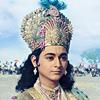
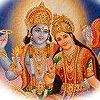



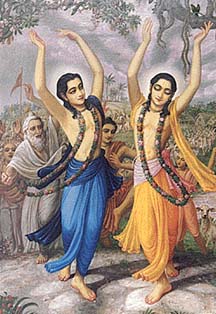
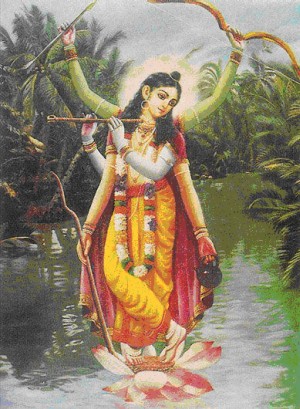
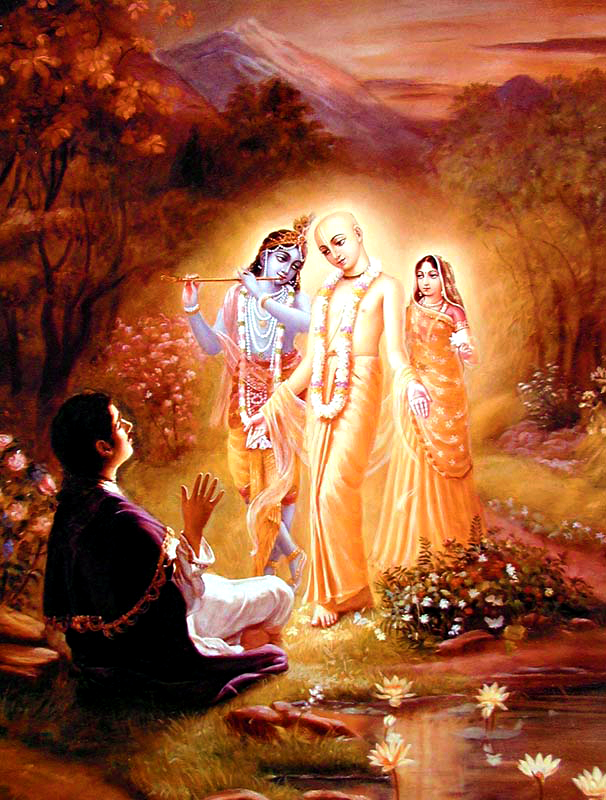
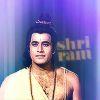


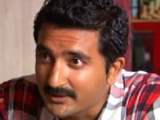

comment:
p_commentcount